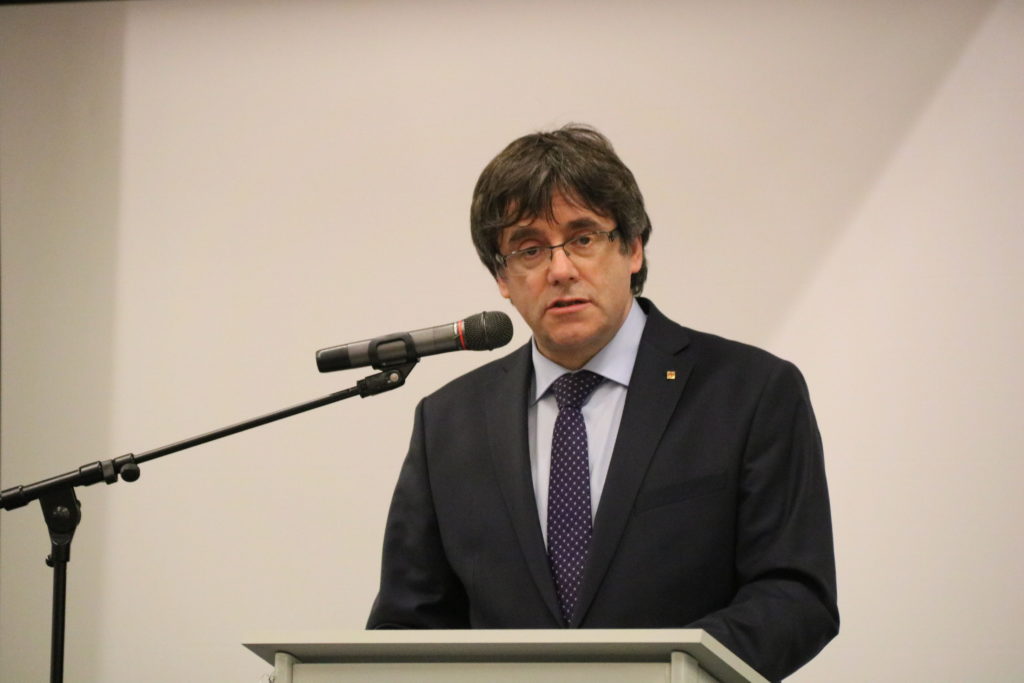27.03.2018 - 16:23
The United Nations has accepted for consideration Carles Puigdemont’s appeal for protection of his political rights. The Council of Human Rights of the international organization will now consider the deposed president’s request, which denounced the violation of the Catalan leader’s right to run for public office, as well as his right of association and peaceful political expression. All these rights are included in the Covenant on Civil and Political Rights, a multilateral treaty adopted by the United Nations General Assembly in 1966. Puigdemont’s appeal for protection of his political rights was filed by his lawyer abroad, Rachel Lindon.
The Council has requested information from Spain about the Catalan leader’s case, and the Spanish authorities now have six months to provide it. In addition, the international body has asked Puigdemont’s lawyer to indicate “what kind of remedy” he wants if the deposed president’s rights are found to have been violated. Meanwhile, the international organization has not applied any precautionary measures.
Puigdemont’s complaint to the United Nations is similar to the appeal filed by the jailed Catalan leader Jordi Sànchez, who became the presidential candidate after Puigdemont’s failed investiture. Sànchez’s appeal also condemns the violation of his rights and asks the United Nations to explore his case. In Sànchez’s case, however, the Council did apply precautionary measures.
“Spain is guilty of violating its international treaty obligations”
Puigdemont’s challenge against the Spanish government took a step further at the beginning of March, when his legal team lodged a formal complaint with the United Nations Human Rights Committee over Spain’s crackdown on Catalonia’s push for independence. In the complaint, Puigdemont’s legal team alleged that “Spain is guilty of violating its international treaty obligations through the cumulative imposition of disproportionate and unjustified restrictions with the exercise of his political rights.”
“Even though he has never been convicted of a crime or stripped of his political rights in a court of law,” reads the appeal, “Puigdemont’s rights to political participation, political expression and political association have been ruptured and ultimately snuffed out, at least for an indeterminate period, in pursuit of Spain’s broad political objection to independence from Catalonia, and in order to stifle political opposition and the expression of dissent.”
In the appeal, Puigdemont’s lawyer argued that Puigdemont has “the right to freedom of association with other secessionist politicians and political parties in pursuit of a common goal of securing independence.” The complaint, which invokes the Universal Declaration of Human Rights and the International Covenant on Civil and Political Rights, also noted the deposed Catalan leader’s “right to freedom of peaceful political expression in support of the cause of independence for Catalonia.”
“Forced to choose between returning to Spain” and remaining “in exile”
His lawyer also stated that “Puigdemont has been forced to choose between returning to Spain where he will inevitably be subject to arbitrary detention and prevented from further political participation, remaining as President in exile and then standing aside to allow an alternative candidate to be nominated and invested as President.”
What’s more, Puigdemont’s appeal before the United Nations stressed that Spain is “locking up political opponents and dissenters for the peaceful expression of political opinion.” The Catalan leader’s lawyer noted in the appeal that Spain’s attitude towards Puigdemont, as well as other pro-independence leaders, is a “hallmark of an undemocratic state.”
The UN’s Human Rights Committee is a body of independent experts that monitors the implementation of the ICCPR by the states who are party to it, which are obliged to submit regular reports on how rights are being implemented. The Committee examines each report and addresses its concerns and recommendations to each state.



